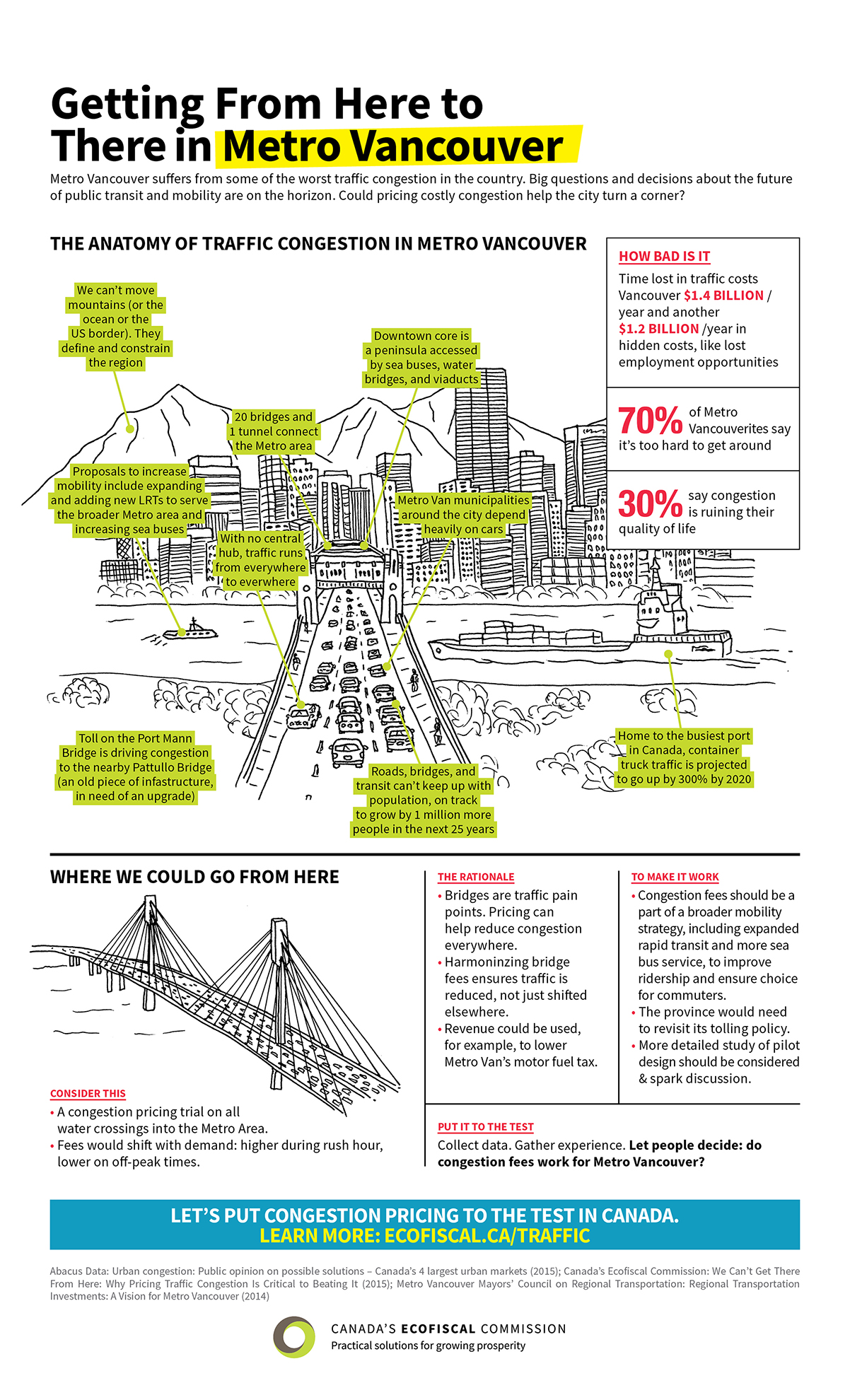Metro Vancouver's bridge and tunnel traffic pinch points should all be tolled as part of a road pricing pilot project to battle worsening congestion.
Harmonized bridge tolling here is one of the proposals on the potential for congestion pricing outlined in a new report by Canada's Ecofiscal Commission, a think tank of economists.
It provides more ammunition for area mayors – who are already studying road pricing – and makes the case that road space is a scarce resource in high demand that is overused if it's free, and is conserved and used more efficiently when there's a charge.
"Governments have been trying lots of things and for the most part they haven't been working," said commission chair Chris Ragan, a McGill University economist. "Our congestion is getting worse as our cities grow. So we think it's time to try a different solution and one that for which there's growing evidence that it actually works."
Ragan visited Vancouver earlier this month and spent an hour and 45 minutes going to Surrey in rush hour via the free Pattullo Bridge and then just 25 minutes back again via the tolled Port Mann Bridge.
He said the clogged conditions on the Pattullo and its approaches stem from the decision to toll the Port Mann Bridge without a coordinated approach at other crossings.
"You want to not just toll one bridge, you want to toll the set of bridges," he said.
He said that change would eliminate the problem of drivers going out of their way to get to an untolled free bridge and in the process adding to traffic congestion.
"We've seen tolls work to reduce congestion on bridges like the Port Mann. But a single toll bridge can push traffic elsewhere."
Adding tolls to the free crossings would encourage some drivers to travel a little earlier, or later, switch to transit, or perhaps work from home some of the time, he said, resulting in much less congested conditions at peak hours for drivers who opt to pay the tolls.
"The fundamental problem with road congestion is not that there are too many cars. The problem is there are too many cars on a particular road at a particular time."
Ragan suggests tolls vary depending on the time of day and the intensity of congestion.
"At 2 in the morning your toll might be zero because the road is empty. But at 6 p.m. that is peak time and that is when you actually pay a toll."
The commission's proposal for bridge tolling is based strictly on delivering relief from congestion, not as a method to raise more money for transit or to replace existing bridges. It says the revenue could be used to reduce existing fuel taxes.
It acknowledges the provincial government would have to change its tolling policy, which currently allows tolls only on new infrastructure and only when there's a reasonable free alternative.
Distance pricing by GPS
Ultimately, the report says, comprehensive distance-based pricing is a possible long-term option for Metro Vancouver, potentially by using GPS tracking to charge for the distance driven.
It concedes privacy concerns would be a "major point of contention" and such a system is "unlikely to be a realistic policy option in the immediate future."
But the report argues it would be more fair than bridge tolls, which don't capture long trips that don't cross the Fraser River or Burrard Inlet.
"Each driver pays directly for the time and use of the roads, no matter where they live in the region."
Would that mean drivers having to pay a charge to drive anywhere in the region?
Not necessarily, Ragan said.
It would only be necessary to charge per kilometre fees on routes where there's significant congestion and potentially only at peak times.
"If you have a road where even at the worst times it flows very well, then you don't have a problem to solve."
Letting solo drivers pay a toll to use HOV lanes is another potential option outlined in the report, although it says that seems more promising for other cities with larger networks of controlled-access freeways.
Pay parking a tool
More pay parking in areas where it's currently free can also help, the report says.
Priced parking adds incentive to take transit instead of driving.
Ragan said it also has been found to reduce traffic congestion because motorists don't have to spend as much time circling blocks in search of an empty stall.
Premier Christy Clark has said any move to road pricing or universal tolling would require another referendum.
Ragan argues a pilot project should be allowed to proceed as a temporary test case.
In Stockholm, Sweden, he said, residents were lukewarm to a proposed road pricing system but support jumped after a 10-month pilot project, resulting in referendum approval.
"A lot of people think this wouldn't work," Ragan said.
"They say 'It's a crazy idea. It's just a tax grab. We've already paid for the roads. We don't have any other choices.'
"But you put these in place and you try them out and they actually do work and people kinda go 'It does work. It is worth it. I'm getting home 30 minutes faster. I like this.' And public support builds."

